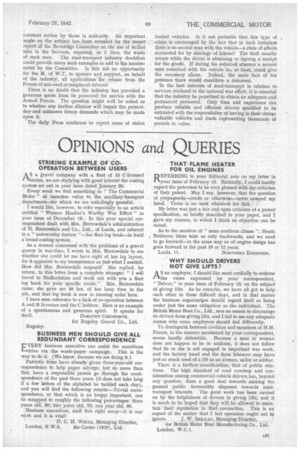OPINIONS and QUERIES STRIKING EXAMPLE OF COOPERATION BETWEEN USERS A s
Page 33

If you've noticed an error in this article please click here to report it so we can fix it.
a gravel company with a fleet of 10 C-licensed lorries, we are studying with great interest the costing system set out in your issue dated January 30.
Every week we find something in "The Commercial Motor" of immense value to the, ancillary-transport department—for which we are unfailingly grateful. I would like, however, -to refer especially to an article entitled "Woman Haulier's Worthy War Effort" in your issue of December 19.. In this your special correspondent dealt with Mrs. Borrowdale's administration of H. Borrowdale and Co., Ltd., of Leeds, and referred to a " noteworthy feature "—her fleet log book—in itself a broad costing system.
As a woman concerned with the problems of a gravel quarry in war-time, I. wrote to Mrs. Borrowdale to see whether she could let me have sight of her log layout, for it appealed to my inexperience as just what I needed. How did Mrs. Borrowdale respond? She replied, by return, to this letter from a complete stranger: " I will travel to Staffordshire and work out with you a fleet log book for your specific needs." Mrs. Borrowdale came; she gave me 48 hrs. of her busy time to the job, and that log book is now in running order 'here.
I have seen reference to a lick of co-operation between A and B licensees and the C holders. Here is an example of a spontaneous and generous spirit. It speaks for itself.DOROTHY CORNFORTH,
for Rugeley Gravel Co., Ltd. Rugeley.
BUSINESS MEN SHOULD GIVE ALLREDU NDANT CORRESPONDENCE EVERY business executive can assist the munitions EVERY via the waste-paper campaign. This is the way to do it.. (We know, because we are doing it.)
Patriotic firms have already given three-year-old correspondence to help paper salvq:e; but do more than this; have a responsible person go through the corrtspondence of the past three years (it does not take bag if a few letters of the alphabet be tackled each day), and you will find the following results:—Trivial correspondence, or that which is no longer important, can be scrapped to roughly the following percentages: three years old, 90; .to years old, 75; one year old, 60.
Business executives, staa this right away—it is war work and it is vital!
D. C. H. WELLs, Managing Director, London, N.W.S. for Carmo (1929), Ltd. THAT. FLAME HEATER FOR OIL ENGINES DEFERRING to your Editorial note on my letter in A %your issue of February 13. Naturally, I could. hardly _expect the patentees to be very pleased with my criticism of their patent. May I say, however, that the question of propaganda—crude or otherwise—never entered my bead. There is no need whatever for this.
My letter was just a fair and open criticism of a patent specification, as briefly described in your paper, and I gave my reasons, to which I think no objection can be raised.
As to the mention of " more northern climes "; Heath Robinson ideas take us only backwards, and we need to go forward—in the same way as oil engine design has gone forward in the past 10 or 12 years.
Leeds, 11. NORTHERN ENGINEER.
WHY SHOULD DRIVERS NOT GIVE LIFTS?
AS an employer, I should like most cordially to endorse the views expressed by your correspondent, " Driver," in your issue of February 13, on the subject of giving lifts. As he remarks, we have all got to help each other in these difficult days, and in that matter the business organization should regard itself as being under just the same obligation as the individual. The British Motor Boat Co., Ltd., sees no reason to discourage its drivers from giving lifts, and I fail to see any adequate reason why some employers should feel differently.
To distinguish between civilians and members of H.M. Forces, in the manner mentioned by your correspondent, seems hardly defensible. Because a man or woman does not happen to be in uniform, it does not follow that he or she is not engaged in important war work, and the factory hand and the farm labourer may have just as much need of a lift as an airman, sailor or soldier.
There is a further. consideration; that of public relations. The high standard of road courtesy and consideration among commercial-vehicle drivers has, beyond any question, done a good deal towards making the general public favourably disposed towards roadtransport interests. The good work has been carried on by the helpfulness of drivers in giving lifts, and it is much to be hoped that they will be allowed to maintain their reputation in that connection. This is an aspect of the matter that I feel operators ought not to ignore. J. W. SHILL', Managing Director, for British Motor Boat Manufacturing Co., Ltd. London, W.C.1.




















































